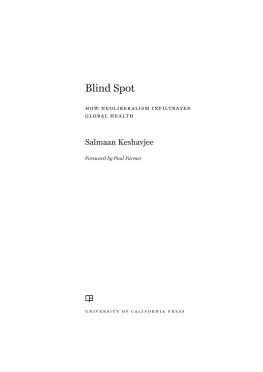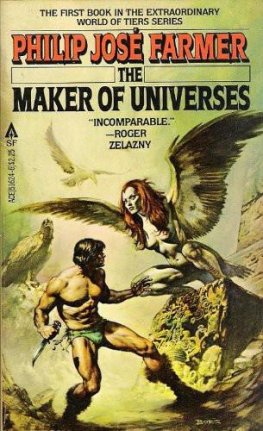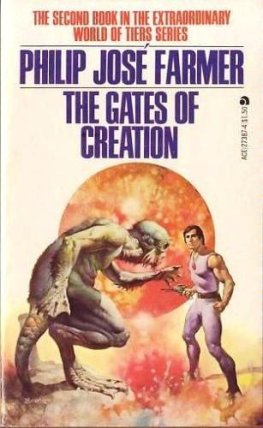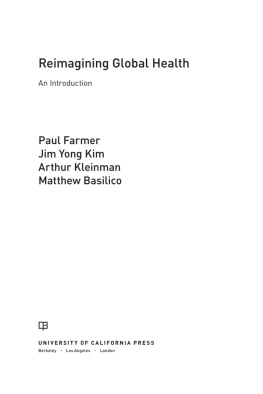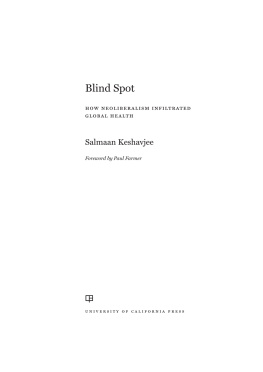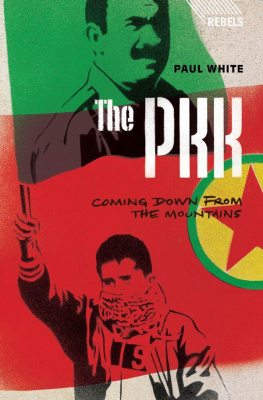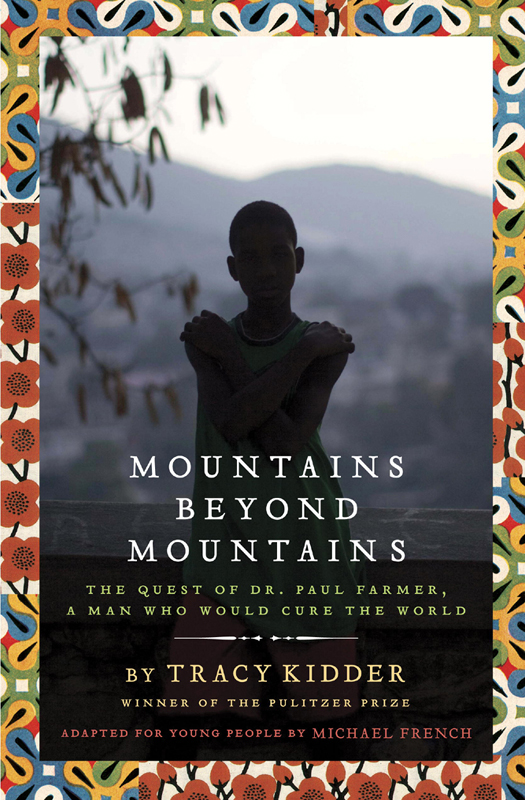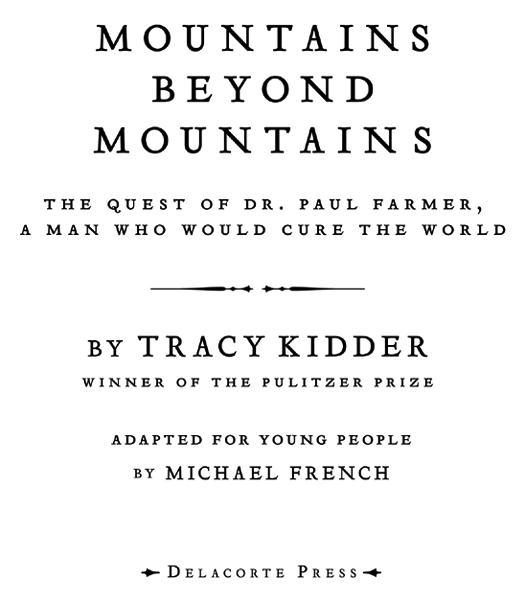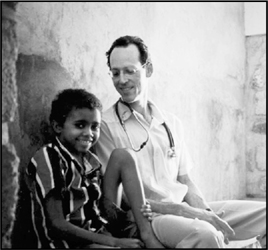Text copyright 2013 by Tracy Kidder
Jacket photograph copyright 2013 by Ron Haviv/VII/Corbis
All rights reserved. Published in the United States by Delacorte Press, an imprint of Random House Childrens Books, a division of Random House, Inc., New York.
This work is based on Mountains Beyond Mountains: The Quest of Dr. Paul Farmer, a Man Who Would Cure the World, copyright 2003 by Tracy Kidder, published in hardcover by Random House, an imprint of The Random House Publishing Group, a division of Random House, Inc., New York, in 2003.
Delacorte Press is a registered trademark and the colophon is a trademark of Random House, Inc.
Frontispiece photograph courtesy of Moupali Das-Douglas, M.D.
Visit us on the Web! randomhouse.com/teens
Educators and librarians, for a variety of teaching tools, visit us at RHTeachersLibrarians.com
Library of Congress Cataloging-in-Publication Data
Kidder, Tracy.
Mountains beyond mountains : the quest of Dr. Paul Farmer, a man who would cure the world / by Tracy Kidder; adapted for young people by Michael French.
p. cm.
Audience: 12 and up.
eISBN: 978-0-307-98088-5
1. Farmer, Paul, 1959Juvenile literature. 2. PhysiciansBiographyJuvenile literature. 3. Missionaries, MedicalBiographyJuvenile literature. 4. PoorMedical careJuvenile literature. 5. Right to healthJuvenile literature. 6. Human rights
Juvenile literature. I. French, Michael. II. Title.
R154.F36K53 2013 610.92dc23
[B]
2012024905
Random House Childrens Books supports the First Amendment and celebrates the right to read.
v3.1_r1
D R . P AUL F ARMER WITH A LCANTE J OSEPH,
AGE FIFTEEN, IN C ANGE , H AITI ,
O CTOBER 2001

F OR H ENRY AND T IM K IDDER

CONTENTS

INTRODUCTION

M OUNTAINS B EYOND M OUNTAINS is a book about a remarkable man, Dr. Paul Farmer. I met him in Haiti, that desperately poor country just a two-hour plane ride from the American mainland. He was spending a large part of his time there, among some of the poorest of the poor, treating their illness and, more important, creating a public health and medical system for them. He seemed to be performing all this difficult work for no personal reward except the satisfaction of doing it. Dr. Farmer could have worked in any number of hospitals in the United States, conducting important research, curing patients, and living a comfortable and respected life. What made him do otherwise? I wrote this book because I was curious about him and I thought his life would make for a good story. I didnt write my book to make people believe in his cause. But well before the end of my research, I did believe.
I had been writing books and magazine articles for a number of years when I met Dr. Farmer. I was not the sort of journalist you see on television or in the movies. I didnt cover the news; I didnt put microphones in peoples faces or go to press conferences. Instead, I wrote about life as it is lived out of the spotlight, by people who are not celebrities. I wrote a book about a team of engineers designing a computer, one about a schoolteacher, another about the building of a house, and even one about some very old people in a nursing home. I wrote about ordinary people, but once I got to know them, I found that none were really ordinary. My most important technique for research was simply hanging out with my subjects. I would try to fit into their lives, to be as unobtrusive as possible, and I would try to understand them by watching what they did.
I hung out with Farmer, too. Although he was not famous when I met him, he was nobodys idea of an ordinary person. He was already an important figure in medicine, public health, and medical anthropology, and he worked impossible hours in impossible circumstances. In one of the poorest parts of Haiti, he had built a modern facility that provided health care for people who were living and dying in abject poverty. He seemed never to sleep. He seemed to be loved and admired not just by his patients but by practically everyone who knew him.
I spent long stretches with him in Haiti and traveled with him internationally. Traveling with Farmer is not like being a tourist. I accompanied him to Russia, a country I had never visited before. On my own, I would have enjoyed touring the Kremlin and certainly would have gone out of my way to see a performance of the Bolshoi Ballet in Moscow. Instead we went to Moscows Central Prison, full of inmates ill and dying from tuberculosis, and then to an even more desperate outpost in Siberia. It was the same in Peru. Most Americans visiting there want to make the ascent to the ancient ruins of Machu Picchu. I would have liked that, too, but to travel with Farmer was to go directly into the tuberculosis-infected slums of Lima. None of this was much fun, to be honest. But it was spellbinding. And it was exhilarating to see how much Farmer and his small group of colleagues were able to accomplish, both in helping individual patients and in changing international health policies.
When you write about people in depth, you are always interested in how they grew up, what they were like as children. And usually you go looking for the evidence. For part of his boyhood Paul lived with his family in an old school bus, which they called the Bluebird Inn. After about five years of that, Farmers father, a great big man who was nicknamed Elbows by people who played basketball with him, moved the whole family onto a half-homemade, fifty-foot-long boat that was moored in a bayou in South Florida. The family had little money, but most of them relished their unorthodox lifestyle, at least when they looked back on it. It seemed as if, for a lot of the time, they had a lot of fun. At one point Pauls father decided to earn his living as a fisherman, but he knew nothing about the ocean, or fishing. The experiment didnt last long. Soon the boat rarely left its place in the bayou.
Paul was a brainy boy and he did well in school, even though he didnt have a bedroom or a quiet place to do his homework. He went to Duke University on a full scholarship, and there discovered first wealth and then migrant farm workers toiling in the fields of North Carolina. Many were Haitian. He became interested in their lives because they seemed so different from the comfortable life he was leading at Duke, and so hidden from that lovely campus. He studied all things Haitian: the countrys religion, its art and music, its language, and its amazing history. Haiti is a country created by former slaves, kidnapped West Africans who threw off their extremely cruel French mastersat times they had to fight the English, tooand created their own republic. Its the only place in the world where this happened, but it happened in 1804, when slavery still flourished here in the United States, and to make a very long and painful story short, Haitians have been punished ever since for claiming their freedom.


